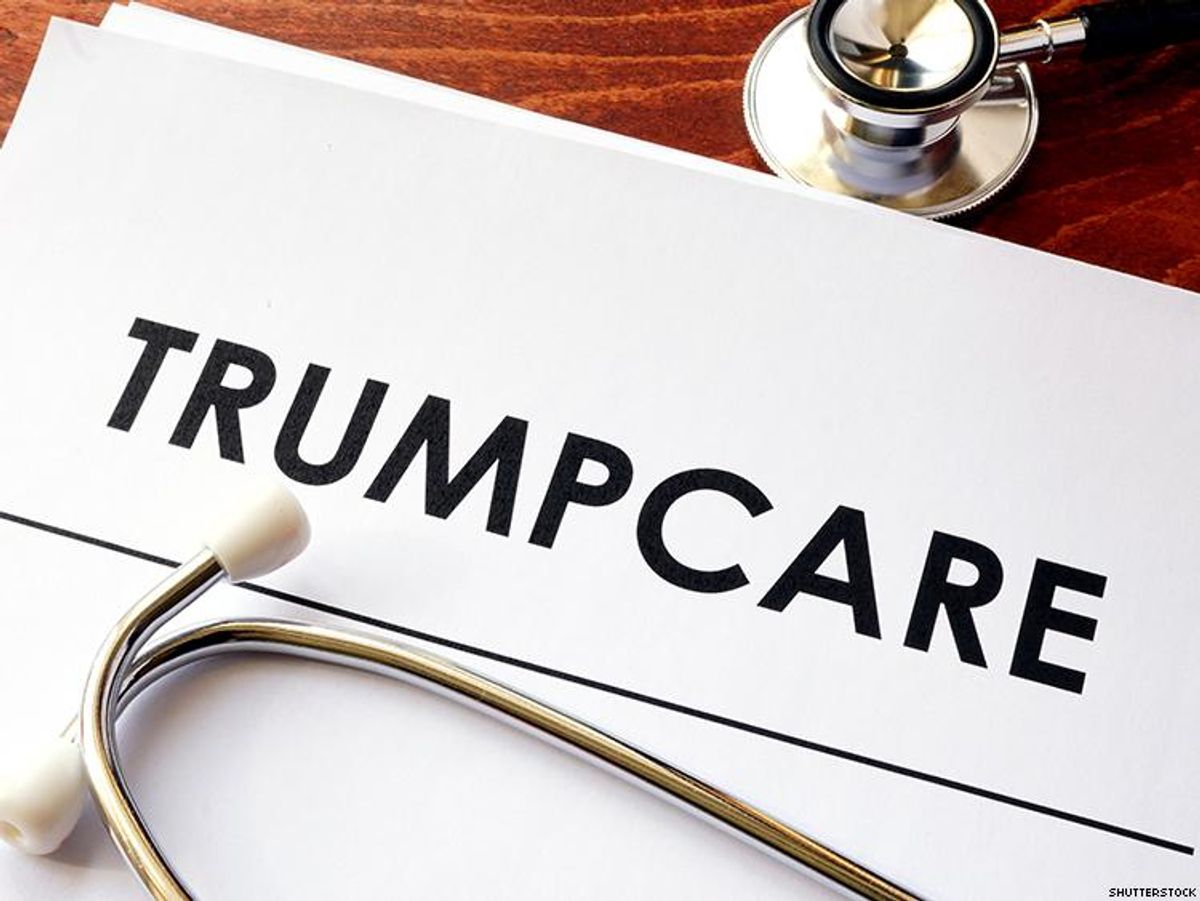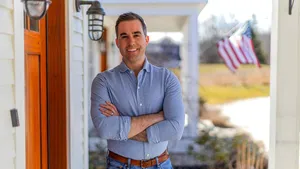All Rights reserved
By continuing to use our site, you agree to our Privacy Policy and Terms of Use.
“Trumpcare equals death.” As Angelenos celebrate Pride Month, those words are displayed on billboards across West Hollywood. The organization behind the slogan, APLA Health, has been offering low-cost treatment to people living with HIV since opening its doors in 1983. The Los Angeles-based care center was the first to hold an AIDS Walk in 1985 to help combat the spread of HIV and AIDS, then at epidemic levels in the United States. In a new report, the organization warns that the embattled Republican plan to “repeal and replace” the Affordable Care Act may set the fight to end HIV back decades. It could return the U.S. to a time of people dying in the streets.
“While the Trump presidency has ushered in an era where the only constant is that there is no telling what’s going to happen next, the Administration’s newly released 2018 budget tells us exactly what they intend,” APLA writes.
(RELATED: Mass Resignation at HIV Council Exposes Trump's Cruelty)
Senate Majority Leader Mitch McConnell is looking to fast-track a Senate version of an earlier House iteration of the American Health Care Act, intending to push for vote befor the Fourth of July recess. While details about that bill are scarce, APLA says we know what to expect: “massive cuts to Medicaid and other health care programs” and “huge reductions in funding for HIV/AIDS.” Donald Trump's budget for discretionary spending, released in May, proposed slashing $610 billion in funding for Medicaid over the next decade; it also would reduce funding under the Ryan White CARE Act, a national program that assists community-based AIDS service organizations, by $59 million.
Phil Curtis, the director of government affairs for APLA Health, said that a GOP health care bill, which further chips away at these programs, would represent a “devastating unraveling” of the widespread access to care available under the Affordable Care Act.
“What Obamacare did was open the private insurance market to people who previously did not have access to it by removing the ban on preexisting conditions,” Curtis said. “The regulation of insurance premiums — along with federal subsidies — made private health insurance affordable for people who couldn’t [otherwise] access it. They could get the doctors they wanted and get the care they needed.”
The Affordable Care Act had a major impact on the lives of HIV-positive Americans. Prior to the passage of the ACA in 2010, the Department of Health and Human Services estimated that 24 percent of the 1.2 million people living with HIV in the U.S. were uninsured. But over the next few years, as the ACA was implemented, that changed dramatically. According to the Kaiser Family Foundation, the number of HIV-positive individuals covered by insurance shot up by nearly 17 percent by 2016.
Central to this success story was the expansion of Medicaid through the ACA, which provided coverage to 386,000 previously uninsured LGBT people living in 26 states. This population is disproportionately affected by HIV.
“It’s an absolute lifeline for people living with HIV,” said Julianna Gonen, policy director for the National Center for Lesbian Rights. “Forty percent of people living with HIV get their health care through the Medicaid program. The bill that we think the Republicans are working on — because they won’t show it to anybody — would not only end the Medicaid expansion under the Affordable Care Act but would change the program dramatically to a block grant system. It would very much shrink the program, and many people would lose coverage this way.”
The Congressional Budget Office, a nonpartisan group, released a report in May estimating that the previous GOP proposal — which passed the House before stalling in the Senate — would result in 23 million people losing insurance over the next nine years. The majority of this group would be those who only recently gained access to coverage under the ACA, including low-income Americans, the elderly, people of color, and those living with HIV.
“More people are going to get sick and more people are going to die,” Curtis said. “That’s the bottom line.”
Chief among the concerns of HIV activists is the future of the preexisting condition clause under the Affordable Care Act, which makes it illegal to deny coverage to an individual due to their HIV-positive status. Since Trump took office in January, his administration has chipped away at Section 1557 of the ACA, the nondiscrimination provision. The Department of Justice announced in May that it would not defend the policy, which covers disability, sexuality, and gender identity; the guidelines would be sent back to the Department of Health and Human Services for reconsideration.
Similar action on protections for people with preexisting conditions would return the United States to a time when many people living with HIV hid their status from their insurers. Either they would be denied coverage, Curtis said, or “pay astronomical premiums for coverage.” Others might refuse to get tested at all because they were afraid that their HIV status would open them up to discrimination.
Certain populations would be affected by this rollback more than others. As the CBO found that the prior Republican plan would increase premiums by 20 percent in the next year, that would be a particular burden for people of color and trans folks, who may have less ability to pay than other segments of the population. A 2015 report from the Movement Advancement Project and Center for American Progress found that transgender people are four times more likely than the average American to live in poverty. They’re also three times more likely to be unemployed.
Should the ACA be repealed, it’s trans women of color who will particularly be put in the cross hairs. This extremely marginalized group is 49 times more likely than members of the general population to be HIV-positive.
Jason Cianciotto, the vice president of policy, advocacy, and communications at Harlem United, said these groups represent the “vast majority” of those the HIV care center serves.
“They frequently don’t have a safe and secure place to live,” Cianciotto said. “They are dealing with long-term addiction, and the housing that is available to them is full of people who are actively using and actively trying to sell them drugs. They’re more likely to be victims of domestic violence, abuse, or harassment. When you take away health insurance or access to mental health care used to keep an addiction in check, you take away someone’s ability to live a normal lifespan.”
Isaiah Wilson knows firsthand that programs like the Affordable Care Act are lifesaving for people living with HIV. Wilson, the director of external affairs at the National Black Justice Coalition, is a black gay man living with HIV. He gets insurance through his employer. Because of Obamacare, his insurer offers what’s known as “essential health benefits” through the marketplace — which includes access to antiretroviral drugs as well as treatment for mental health or substance abuse issues. These benefits ensure that Wilson has access to the daily treatment that allows him to live a happy, healthy life.
“If the marketplace were to change, I don’t know what benefits I would have,” Wilson said. “If that were to be taken away, who knows what the future looks like?”
Those programs could be in jeopardy due to a provision of the prior draft of the American Health Care Act called the MacArthur Amendment. Those guidelines, if implemented, would allow individual insurers to decide what benefits they offer, which they don’t, and how much they charge for them. Getting critical prescription drugs could become astronomically expensive — if they are covered at all.
Essential safety net programs like the Ryan White Act will remain in place if Republicans manage to pass a version of the ACHA that guts many of the crucial services that people living with HIV rely on to survive, but these options are designed to be last-ditch care, not an individual’s primary health coverage. It’s an “incomplete health coverage package,” Curtis said, and one that varies state by state. While the program in California is well-funded, people living with HIV can’t get into the program in many states.
“You don’t even have wait lists because getting into the program is so difficult,” he said, adding that repealing the Affordable Care Act would have “calamitous consequences across the country.”
Many of those states with reduced access to care are already feeling the strain of what The New York Times has called “America’s Hidden HIV Epidemic.” Mississippi, which blocked plans to expand Medicaid under the ACA, has the highest rate of new HIV infections in the country. Four in 10 men who have sex with men living in Jackson, the state’s capital, are positive. This rate is likely to increase in a city with an extremely high nonwhite population: The Centers for Disease Control has estimated that half of black MSM and a quarter of Latin MSM will contract the virus during their lifetime.
Just last year, activists dreamed of an end to HIV, with Truvada approved for HIV prevention, reducing the likelihood of contracting the virus by up to 99 percent if taken as directed. But whatever piece of legislation that the GOP attempts to force through Congress — yet again — seeks to assure the fight will drag on for decades to come.
“The Republican health care plan will make ending the HIV/AIDS epidemic in this country nearly impossible,” Curtis said. “These people are going to have disease and death on their hands.”


































































